- Home
- Media Kit
- Current Issue
- Past Issues
- Ad Specs-Submission
- Ad Print Settings
- Reprints (PDF)
- Photo Specifications (PDF)
- Contact Us

![]()
ONLINE

The Power
of Human Capital
Editors’ Note
Miles Nadal (milesnadal.com) is an international entrepreneur and philanthropist. He passionately believes in championing people to pursue their dreams without limit, having founded the Dare to Dream initiative to support both ambitious entrepreneurs and those in need. The principal motivating factor behind Nadal’s business success is his desire to make a difference in the world by giving back. After starting a photography business while in junior high school, he later founded Action Photographics which included a team of professional photographers, as well as a commercial photography business. That was ultimately transformed into Multi-Disciplinary Communications and then MDC Partners Inc., which became one of the largest marketing and communications companies in the world. Nadal has been nominated for Canada’s Top 40 Under 40, was the recipient of Ernst & Young’s Entrepreneur Of The Year Award®, and was awarded the Outstanding Volunteer Award by the Greater Toronto Chapter of the Association of Fundraising Professionals. Among his awards are the Harold Lederman Award for Philanthropic Leadership, Jewish National Fund Negev Honoree, Toronto Chapter of the American Marketing Association Marketing Hall of Legends, Executive of the Year by MEDIA Magazine, and Damon Runyon Cancer Research Foundation honoree. Nadal was awarded an Honorary Doctorate of Philosophy degree from Tel Aviv University, and was recognized for contributions to Harlem RBI, an initiative for youth playing, growing, and learning. He is a member of the Board of Governors of Tel Aviv University where he endowed a home for technological innovation and entrepreneurship.
Firm Brief
Peerage Capital (peeragecapital.com) is a leading North American business services and private investment firm. It is focused on partnering with exceptional management teams to form long-term investments across several strategic business services platforms including real estate services, real estate ownership, land assembly, asset management and wealth advisory services. Its growing network of partner companies currently employs 2,000 people across Canada and the United States approaching $6 billion in total assets under management.
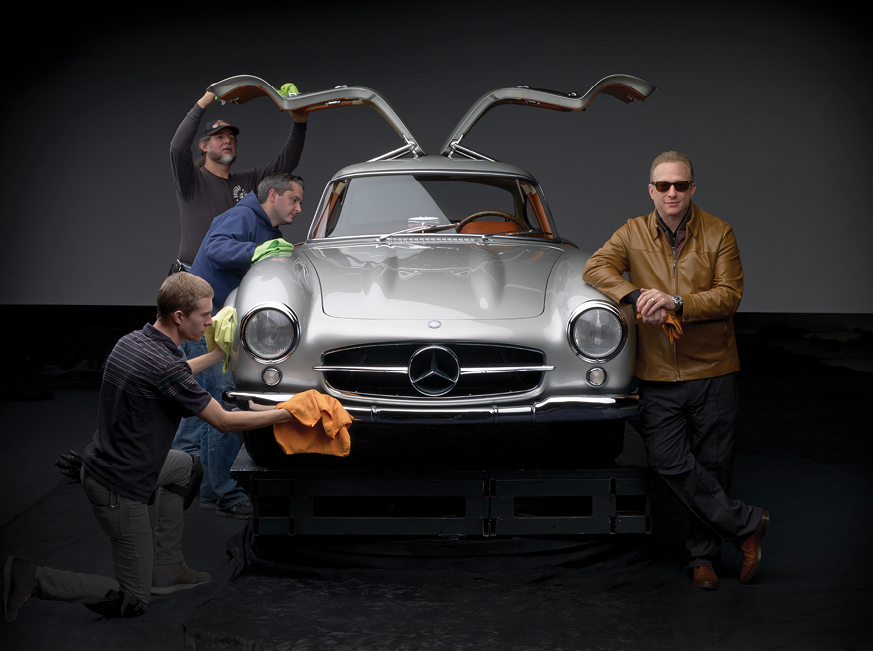
Miles Nadal with his 1955 Mercedes Benz 300 SL Gullwing
What was your vision in creating Peerage Capital?
The idea was to use the methodology, philosophy and cultural elements that made us successful over the last 40 years. Simply put, we believe in the power of human capital. Peerage partners with management teams that have entrepreneurial DNA, great focus, exceptional discipline, and a vision to build businesses. Then, we provide capital and other strategic and financial resources to foster growth, yielding mutually beneficial success. Our fundamental belief is that management has to have both emotional and financial ownership in an enterprise to succeed.
We are focused on two primary areas, real estate and financial services. In financial services, we’re going on $6 billion of assets under management, about 15 percent of which is in the United States, and 85 percent is in Canada. Our target clients are high-net worth individuals, institutional and family office asset management.
The real estate services business has two core components. The first is physical real estate, where we’re a developer and a creator of self-storage infrastructure and facilities. We have 2 million square feet under management, ownership, development and administration. Our goal is to build this to 5 to 10 million square feet over the next 10 to 15 years. The reason for focusing on self-storage is because in the United States, self-storage is about 9 square feet per capita, whereas in Toronto and in and around the Greater Toronto Area (GTA), it’s only about 2.5 square feet per capita, so it is much less mature and represents a significant opportunity for further growth.
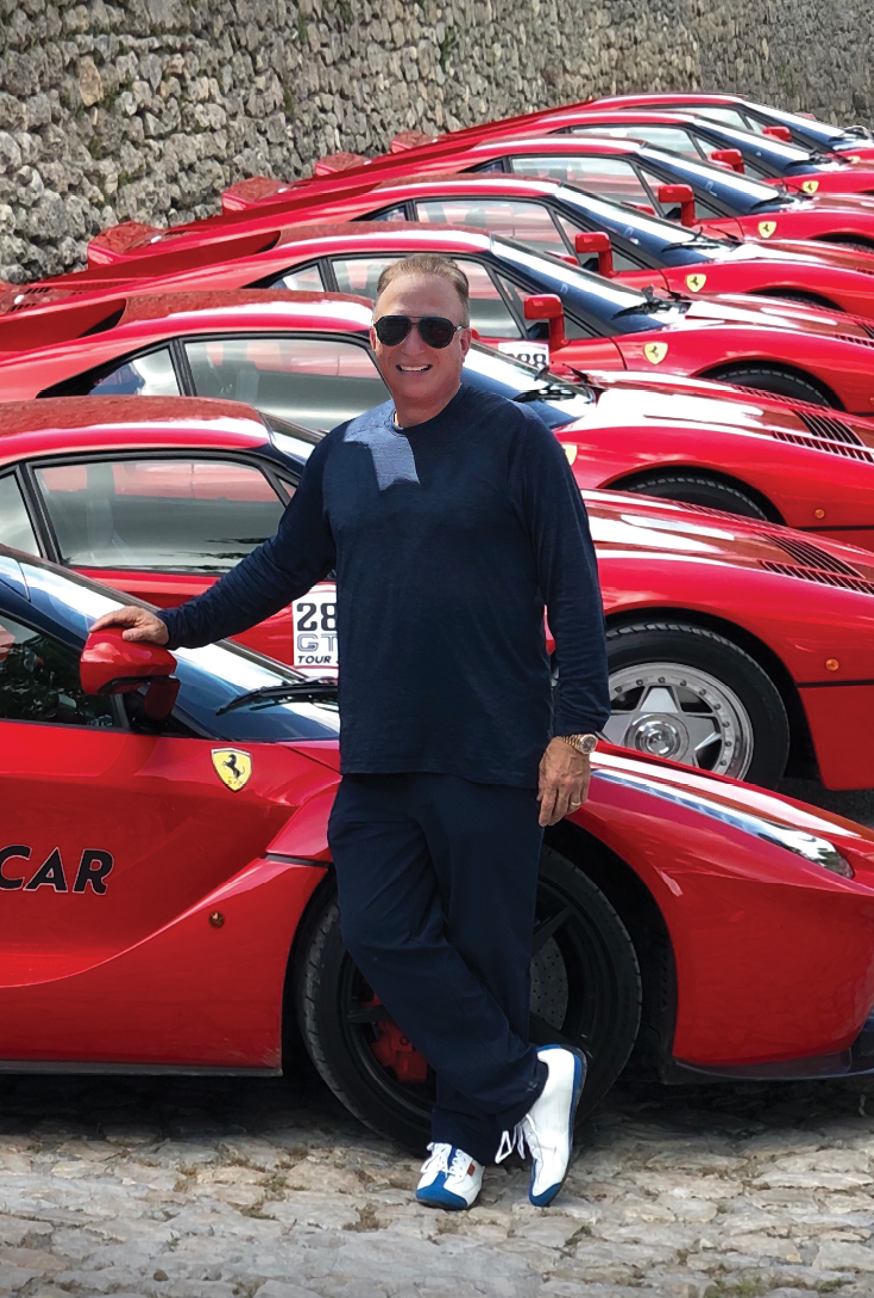
Nadal in the South of France for the 2019 Ferrari 288 GTO tour
We also are involved in the land assembly business, and that’s been a wonderful business, in and around Toronto and the GTA. Toronto has been an extraordinary market. It’s the fourth largest market for real estate, and fourth largest city in North America, and has more cranes per capita than any other place in North America. We have been very blessed there. Just ahead of the global financial meltdown in 2007, we got involved in the residential real estate brokerage business. It may not have been the best possible timing, but as Frederic Nietzsche said, “that which does not kill us, makes us stronger.” Since then, we have achieved great results. Now, under the Sotheby’s International Realty brand in Canada, independent firms like Chestnut Park, Baker Real Estate, Fifth Avenue, and a firm called Street City in Canada, as well as Madison Partners in Denver, Colorado, it is our ambition to expand and acquire both well-known brands like Sotheby’s, as well as independent firms across North America.
We will sell $20 billion of residential real estate in 2020, but our goal is to expand that to $75 to $100 billion a year in the next 10 or 15 years. We would do that by replicating the same approach that has historically enabled us to succeed in the service businesses.
One of the reasons we like this space is because it remains a somewhat contrarian investment. People are concerned about housing, they’re concerned about the economy, they’re concerned about interest rates, they’re concerned about the traditional business model with the real estate agents. We actually feel that great brands like Sotheby’s, which is one of the most prestigious and well-known residential real estate brokerage networks in the world, fortified with long-term capital investment from Peerage, will enable us to prosper and succeed over the long term. That will be true even if there is another setback in the economy or anything else that might happen as a short-term aberration.
When you are making investments, how critical is human capital and the talent of the management team in place?
We want to invest with proven winners who have a long-term track record of success. We want firms that have scaled and become successful, but that are looking for some succession plan or capital investment with a longer-term horizon than they might have as an individual owner/manager. We’re looking for firms that want to add on other core services. In the real estate sector, that could mean mortgage, title, escrow and insurance. It could also include those that want to expand their geographic footprint or are considering “tuck under” acquisitions. These are all ways by which, over a five or ten-year period, they could double or triple the size of their business and, more importantly, the economic return to them as owners and to us as their partners.
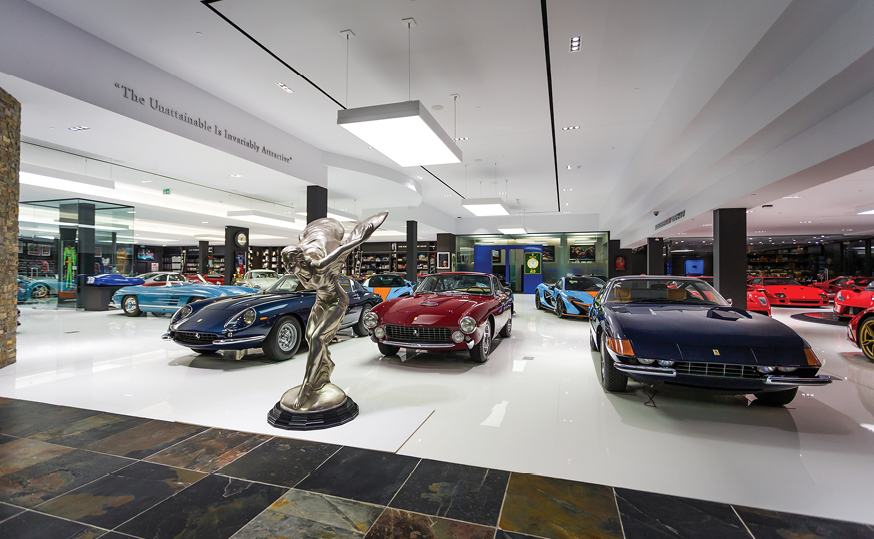
Dare to Dream car collection in Toronto
Is being an entrepreneur something that you can learn or is it something that a person is born with the ability to do?
Being an entrepreneur is a mindset that frames your approach to every aspect of your life – not just business. Personally, I’ve had that mindset for as long as I can remember.
Although I have a relatively modest formal education, I consider myself a well-educated person as a result of my life and business experiences and networking with hundreds of extraordinary people over the last 40 years.
By design, I have always employed myself and have never worked for others, but I have certainly learned from watching closely and listening carefully. Since the age of 12, all I have known is work and the drive to be self-sufficient. I do believe that every one of the partners within Peerage Capital have developed strong entrepreneurial strengths in their own ways, and I believe that they will continue to grow, develop and manage the prosperity of these organizations long after I’m gone. That said, they may not have the same skills or the threshold for risk that I do. I started from scratch, borrowed from the bank, and committed everything to my vision. But as my partners, they don’t have to do that. It’s what I did to establish our platform.
What we need from them is their energy, sectoral expertise, fiscal management, organizational skills, and the ability to identify and drive growth opportunities through prudent and disciplined capital allocation decisions. I know the combination of what I bring to the table as a pure entrepreneur and their experience as great executives, managers and leaders, is tremendously powerful. I don’t think we would be as successful as we are if Peerage just relied on my entrepreneurial approach, and we wouldn’t be as successful if we just relied on their professional management and leadership abilities.

Nadal with fellow car collector and entertainer, Jay Leno
You are heavily committed to philanthropy. Do the skills that made you successful as an entrepreneur and businessman translate to philanthropy, and do you look at your philanthropic work from a business perspective?
I truly think it’s an honor and a privilege to give back. There’s a great quote from Forest Witcraft that I use frequently: “A hundred years from now it will not matter what my bank account was, the sort of house I lived in, or the kind of car I drove. But the world may be different, because I was important in the life of a child.”
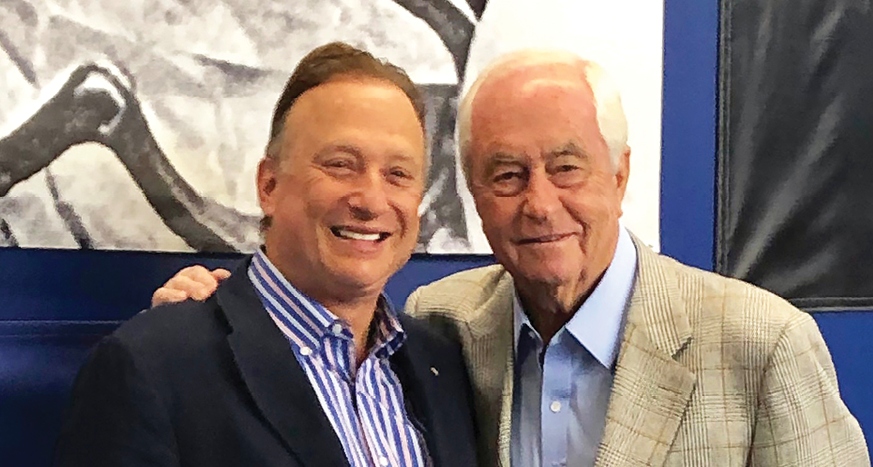
Nadal with entrepreneur and racing legend, Roger Penske
I learned about philanthropy when I was very young. My family had modest means, and I got subsidized to go to summer camp at what is the Jewish community center in Toronto, which is the equivalent of the 92nd Street Y. I vowed that if I could ever give back to it, I would do so. Today, the center is named after my family.
Throughout my life, I’ve focused on ways to leverage philanthropic opportunities by deploying my knowledge of and faith in the power of entrepreneurship. As in business, I believe in setting goals, empowering others, providing a hand up, and clearing the path forward. I also embrace causes that have emotional resonance for me. These are things that I can relate to, and areas where I think we can make a really meaningful difference. My focus is on healthcare, building stronger communities, giving children hope and opportunity, and everything to do with education. Supporting Israel is also a big part of my philanthropy.
Is it important to have metrics around your philanthropic work to track impact or is some of it more emotionally driven?
At the outset, I was probably more driven by gut instinct and emotion. However, as that philanthropic engagement grows, it just makes sense to start putting more metrics of performance in place. But still, at the end of the day, you give to those organizations that you like, admire, respect, trust and believe in. For example, my family, through my life partner, Kelly, has started a wonderful organization called HART. It’s about eliminating human trafficking of young girls in Toronto. It’s something that she researched, it’s something that she got involved with, and it’s something that we as a family and Peerage, as an organization, are very deeply invested in. You need to have things that you relate to, and are emotionally attached to, but over time you need to invest – especially if it’s substantial dollars – in results that you can measure.

Nadal with a few classic automobiles from
the Iconic Automobile Book
You also have clear passions in life, one being for special cars. Where did that passion develop?
Growing up, we never had a new car. In fact, my dad never owned a car during my lifetime. As a result, I always aspired to have nice cars, and over time I started to collect them. The first car I ever collected was an Aston Martin DB7 Vantage convertible, and I bought that in 2001. Shortly after that, I bought a 1972 Mercedes 280SE convertible. When I turned 50, I decided I would start to buy more cars, and then I went and visited Ralph Lauren and Jay Leno. Their world-class collections inspired me to pursue my passion for functional design even further.
Over time, the collection grew and we identified a unique space that we could make into an integrated facility of a museum and a corporate headquarters for the family office. It has continued to be a real labor of love.
More recently, I acquired a collection of rare sneakers. It’s the same rationale as the cars: a profound admiration for the convergence of art, design, popular culture and practical purpose.
I had read about Sotheby’s, the auction house, and Stadium Goods promoting the auction of the “The Ultimate Sneaker Collection” and it captured my imagination. I asked them to pick out six pairs of sneakers for me from the auction. They did that, but they also offered me the opportunity to privately purchase the entire collection. I thought it sounded like a good idea to keep such a unique collection together and I decided to do that. Although I did it for my own reasons, it became a global phenomenon because it was the most valuable collection of sneakers ever assembled.
When I bought the most valuable sneakers ever auctioned, it became part of the Guinness Book of World Records, and some 300 media outlets around the world reported on it, and hundreds of millions of people around the world saw this. It wasn’t something that I had any idea would have this level of interest. I just thought that it complemented the car collection in an interesting way. That is how I operate. I follow my instincts, and if I think it’s going to be rewarding, enjoyable, and gratifying, I do it.
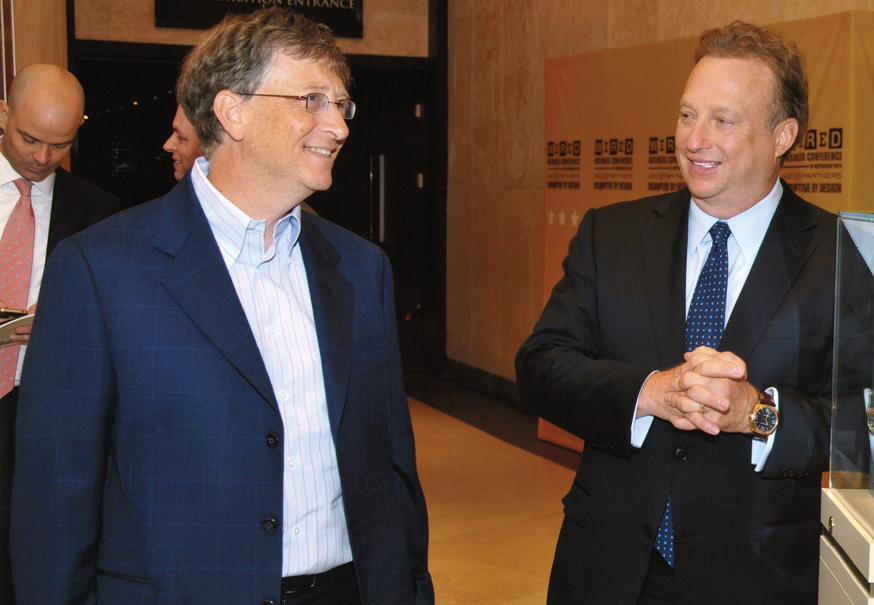
Nadal with philanthropist Bill Gates
How important has it been for you to never lose sight of your beginnings?
Kelly and I have 4 daughters between us. Sarah, is 29 Samantha is 27, Olivia is 26 and Julia is 22. I constantly remind them to never stop being grateful, to never stop counting their blessings, and to always appreciate everyone and everything around them.
Personally, I never lose sight of where I came from and what it took to get where I am today. My business took almost 40 years of persistence, determination, and effort to build. I may have come from very humble beginnings financially, but the legacy my parents left me is my real riches. They were loving and supportive and gave me the values by which I’ve lived by my whole life.
Do you take moments to appreciate what you have accomplished and celebrate the wins?
In 2015, I suddenly hit a bit of a rough patch and went through some corporate hardship and some family health issues as well. That experience gave me a totally different perspective of the world. I realized that if I died the next day, if I was twice as wealthy and had twice the income, it wouldn’t change my happiness. As a result, I do everything I can to balance my physical, mental and emotional health with my financial and business goals. I focus a lot on that.
I think the only thing you leave on the face of this earth that has any meaning are your children. Kelly and I feel very blessed by our kids, and I never forget that. Ultimately, it’s those relationships that feed your soul.
I try to enjoy the fruits of my labor, to share it with others, to never lose sight of where I came from, and to make sure, to the best of my ability, that I smell the roses. But it’s a challenge. Personality is fate and I’ve always been very driven, very high-energy. My greatest wish is that at the end of my life, my children will say: “My dad was always there for me. My dad was always there to answer the phone, to spend time with us, and he gave us unconditional love, valuable advice, and we always knew we were his most important priority.” That’s the most important thing. That’s what my parents gave me.
The second thing is that although I think we are successfully building a substantial business enterprise, in the large scheme of things, no one is going to remember this 25 years from now. I hope, though, that the good we are doing along the way for the community and for individuals, endures. If those people we helped are then able to give back, and we have created a virtuous circle that sustains goodwill, then I will have accomplished what I wanted to.
I believe this will be an important part of my long-term legacy, and one we have structured for my family to continue for many decades in the future.•
